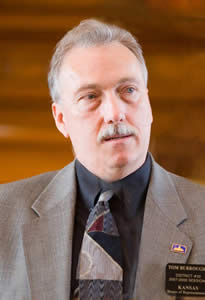
Democrats say it was a ‘power grab’ by Brownback and Republicans
The Kansas House of Representatives has rejected an effort that would have amended the Kansas Constitution to change the way judges are selected.
The measure, which required a two-thirds majority (84 votes) failed by a vote of 68 to 54.
The resolution proposed that Kansas Supreme Court justice selection would be changed from a merit-based system to a federal system model.
Under the proposed system, a nine-person nominating commission would have been replaced by an appointment by the governor and Senate confirmation.
“This resolution unnecessarily politicizes the Kansas Supreme Court and the method by which the justices are selected,” stated House Minority Leader Tom Burroughs, D-33rd Dist. “This is a blatant power grab by Gov. Brownback and his allies. They’ve mismanaged the state’s schools, roads, budget, and economy and now they want control over the courts.”
Established in 1958, the current process ended political corruption and replaced the formerly secretive process with a more transparent and open selection process, according to the House Democratic leader. The merit based system used now selects judges based on qualifications not cronyism or for political agenda.
“We depend upon the courts to uphold the Constitution and for their rulings to be fair, impartial, and apolitical,” Rep. Burroughs stated. “Kansans can’t afford to turn the courts over to politicians, who think they should decide which cases the court should hear and how the court should rule.”
Voting against the resolution from Wyandotte County were Rep. Burroughs, Rep. Pam Curtis, Rep. Stan Frownfelter, Rep. Broderick Henderson, Rep. Louis Ruiz, Rep. Valdenia Winn and Rep. Kathy Wolfe Moore.
Five representatives were among several who submitted a statement on why they voted yes: “The judicial selection process in Kansas has been the subject of much controversy over the past several years. This vote is about nothing more than giving the people of Kansas a chance to vote on the way our state places Supreme Court Justices on the bench. A vote against this is a vote against giving our constituents a direct voice on this issue. For that reason, I vote yes on HCR 5005.” – Reps. John Whitmer, Willie Dove, Will Carpenter, John Bradford and Kevin Jones.
The resolution was HCR 5005.
